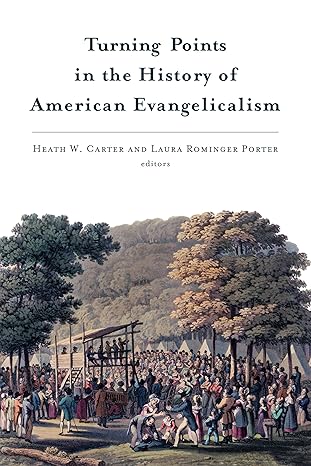A “Bonus” Brief Book Summary from Books At a Glance
Overview of the Book
Turning Points in the History of American Evangelicalism consists of a collection of twelve essays by prominent historians, spotlighting the major “turning points” that shaped the development of evangelicalism in the United States. Rather than offering a strict definition of evangelicalism, Carter and Porter curate essays that reveal a shared genealogy through pivotal moments in its development. Designed both as a tribute to historian Mark Noll and as a historiographical roadmap, the volume emphasizes significant transitions—each essay encapsulates the shift “before” and “after” a key event. The book’s scope spans from colonial America to the global stage of the late 20th century.
Table of Contents
- What Made the Great Awakening Great? (Harry S. Stout)
- The Evangelical Encounter with the Enlightenment (Catherine A. Brekus)
- Disestablishment as American Sisyphus (Jon Butler)
- Antebellum Reform (Richard Carwardine)
- The Rise of the Domestic Ideal in the United States and Canada (Marguerite Van Die)
- The Civil War and the Making of Conservative American Evangelicalism (Luke E. Harlow)
- The Rise of Fundamentalism (George M. Marsden)
- Urban Pentecostalism: Chicago, 1906–1912 (Edith L. Blumhofer)
- The Great Migration (Dennis C. Dickerson)
- The Global Turn in American Evangelicalism (Mark Hutchinson)
- Billy Graham’s 1949 Los Angeles Revival (Grant Wacker)
- Lausanne ‘74 and American Evangelicalism’s Latin Turn (Darren Dochuk)
Afterword by Martin E. Marty
Brief Chapter Descriptions:
- What Made the Great Awakening Great? (Harry S. Stout)
Revisits the First Great Awakening, arguing that George Whitefield and Jonathan Edwards did not just stir revival—they catalyzed transformative spiritual, social, and intellectual shifts that are foundational to American evangelical identity. - The Evangelical Encounter with the Enlightenment (Catherine A. Brekus)
Explores evangelical engagement with Enlightenment ideas, not through famous theologians, but via less-studied figures such as Sarah Osborn and Newport Gardner, revealing how evangelicalism negotiated faith and reason. - Disestablishment as American Sisyphus (Jon Butler)
Breaks from the volume’s evangelical focus to argue that the true turning point in American history was religious disestablishment—not evangelicalism itself—highlighting the First Amendment’s foundational role. . . .
The remainder of this article is premium content. Become a member to continue reading.
Already have an account? Sign In
